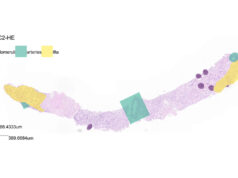Despite not reducing rates of delayed graft function in kidneys from donation after circulatory death (DCD) donors, the novel organ storage technique of normothermic machine perfusion (NMP) has demonstrated the potential to improve renal function in DCD kidneys.
These are the concluding findings of a randomised controlled trial (RCT) published in the British Journal of Surgery (BJS). In their report, Sarah Hosgood (Addenbrooke’s Hospital/University of Cambridge, Cambridge, UK) and colleagues state that this is the first trial to compare NMP to conventional cold storage in DCD kidney transplantation, and also the first RCT of NMP in clinical transplantation more generally.
Hosgood et al begin their BJS paper by noting that kidneys from DCD donors are more susceptible to cold storage injury and carry a high risk of delayed graft function. As such, they set out to directly compare NMP—a more physiological organ preservation technique whereby a warm perfusion solution is circulated through the kidney vasculature to supply oxygen and nutrients—to the conventional approach of static cold storage.
In a multicentre RCT, DCD kidneys were randomised to either NMP or cold storage, they report. NMP kidneys were perfused for 60 minutes with an oxygenated, red cell-based solution (36°C).
The trial’s primary endpoint was delayed graft function—defined as the requirement for dialysis in the first seven days post-kidney transplant—while secondary outcome measures included renal function up to 12 months post-transplant, and patient/graft survival. For all of these outcome measures, a logistic regression model, adjusted for cold ischaemic time, donor age, left/right kidney and centre, was used.
Detailing their results, Hosgood et al state that, from February 2016 through March 2020, 338 kidneys were randomised into the trial. Twenty-five kidneys did not undergo NMP due to logistical or technical difficulties, but were included in an intention-to-treat analysis, and an additional 27 kidneys in the NMP group and 21 in the cold storage group were not transplanted and were therefore excluded. This led to a total of 143 NMP kidneys and 147 cold storage kidneys ultimately being analysed.
As per the trial’s primary endpoint, there was no significant difference in the rate of delayed graft function between the NMP group (61%) and the cold storage group (58%, p=0.624). However, the authors note that secondary outcome measures demonstrated a significantly higher creatinine reduction ratio day 2 (CRR2, p=0.035), and significantly lower levels of serum creatinine across all timepoints (p=0.024), in the NMP group versus the cold storage group.
This led Hosgood et al to conclude that a short end period of NMP did not reduce delayed graft function rates in DCD kidneys but that, nevertheless, their results as a whole suggest that NMP may improve the renal function of DCD kidneys.











